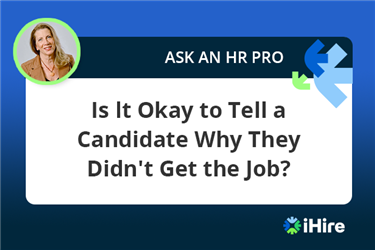- Employer Resources
- |
- Last Updated: February 08, 2023

How to Get Candidate Experience Feedback
Providing a positive candidate experience throughout the hiring process is critical to maintaining a strong employer brand, but how do you know if your company’s candidate experience is a good one? One of the best ways to ensure that experience is top-notch is to ask your candidates themselves about how they perceived your hiring process with a candidate experience survey.
Figuring out the specifics of that survey, like when to ask for feedback or the best candidate experience survey questions to ask, isn’t always easy, though. Below are some tips to help you create a solid plan to get and understand candidate feedback.
Why Should You Ask for Candidate Experience Feedback?
It’s all about your employer brand. In today’s labor market, a strong employer brand and positive candidate experience are key if you want to compete for top talent. Companies with positive branding (for example, being known as a place of stability and growth) are extremely attractive to top-tier candidates. But negative branding has severe repercussions. Not only can negative branding scare away potentially great candidates, but it can also affect current employee engagement and retention.
A poor application process, a messy interview, or an unresponsive recruiter can chip away at your employer brand, and the only way to really know what your applicants think is to ask them directly.

How to Ask for Candidate Experience Feedback
The main way you’ll get applicant feedback is with a candidate experience survey, and these can be conducted through a variety of mediums. A digital survey using a platform like SurveyMonkey or Google Forms and delivered by email is generally the easiest for a busy hiring team, but phone or in-person surveys can sometimes give more in-depth feedback. You should let the candidate know you’ll be following up for feedback, so they know to look for the email or call, and for online surveys, make sure your candidates’ privacy and anonymity are respected.
You don’t want to include too many questions in your surveys either, usually no more than 10. Go for quality over quantity; it will lead to better feedback and more responses. The most important aspect of a survey is to have pre-determined questions that you ask every candidate, and to make sure those questions can give you actionable results.
When Should You Ask for Candidate Feedback?
Knowing when to ask for candidate feedback or when to send an applicant experience survey can be tricky if you’ve never done one before. The timing of your survey will mostly depend on what kind of data you’re trying to collect. You can get very granular data by asking for feedback after every step in the process, but that could also be overwhelming, and the response rate will drop significantly by the end.
Usually, you’ll want to ask your candidates to take your survey after they’ve gone through your typical interview process so they can give accurate and complete feedback. You can ask immediately after they go through the process or wait until you’ve made a candidate an offer. Asking immediately ensures that the process is fresh on the candidate’s mind, but if you wait until after the candidate knows the result of their interview, you might get more truthful feedback since the candidate won’t be worried about saying the “wrong thing.”
Create Your Account Today
The Best Candidate Experience Survey Questions to Ask
When asking for applicant feedback, you’ll want to include both open- and closed-ended questions. Questions with answers on a four-point scale are better than simple “yes” or “no” questions, too. Here are a few sample questions you can ask:
-
The job description was clear and understandable
-
The application was easy to fill out
-
The recruiter was clear about the next steps
-
I was kept in the loop throughout the hiring process
-
The recruiter answered my questions on a timely basis
-
Overall, I am satisfied with the recruiting process at [company name]
Closed-ended questions are easy to answer for applicants, but they don’t always give in-depth insights. If there’s something you’re really trying to uncover about your candidate experience, you should include an open-ended question or two about the topic you want to learn more about in your applicant experience survey.
-
Overall, how did you like the recruiting process at [company name]? Why?
-
What are the top three things we need to do to improve our recruiting process?
-
Would you refer others to apply for an open position at [company name]. Why?
-
Did your discussion with the recruiter reflect what you read in the job posting?
-
How friendly/warm was the receptionist when you arrived for your interview?
-
How clearly did our recruiter explain the steps of the hiring process and job details?

What to Do to With Your Candidate Feedback
Once you have your candidate feedback, what do you actually do with it? Well, if your questions gave you actionable insights, you’ll want to put those answers to good use. To start, you should wait for a sizeable number of responses before making any drastic changes. Look for trends in the responses, and then set a plan in place to amend your hiring process. Then, once a change has been put in place, compare the next set of responses to the previous ones to see if your change had a positive impact.
Don’t just focus on the negatives, though! Sharing positive feedback with your team can boost morale, and you can consider using some responses as testimonials on your website or social media. Make sure you ask the candidate before you share their thoughts publicly.
If you follow these candidate experience survey best practices, you’ll be well on your way to improving your candidate experience and ensuring that your employer brand remains strong

Originally Published: July 30, 2021




